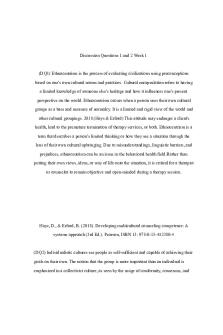Discussion Questions Week1 PDF

| Title | Discussion Questions Week1 |
|---|---|
| Course | Cultural and Social Diversity in Behavioral Health |
| Institution | Grand Canyon University |
| Pages | 2 |
| File Size | 56.6 KB |
| File Type | |
| Total Downloads | 20 |
| Total Views | 160 |
Summary
Discussion questions one and two for week one....
Description
Discussion Questions 1 and 2 Week 1
(DQ1) Ethnocentrism is the process of evaluating civilizations using preconceptions based on one's own cultural norms and practices. Cultural encapsulation refers to having a limited knowledge of someone else's heritage and how it influences one's present perspective on the world. Ethnocentrism occurs when a person uses their own cultural groups as a base and measure of normalcy. It is a limited and rigid view of the world and other cultural groupings. 2018 (Hays & Erford) This attitude may endanger a client's health, lead to the premature termination of therapy services, or both. Ethnocentrism is a term that describes a person's limited thinking or how they see a situation through the lens of their own cultural upbringing. Due to misunderstandings, linguistic barriers, and prejudices, ethnocentrism can be an issue in the behavioral health field.Rather than putting their own views, ideas, or way of life onto the situation, it is critical for a therapist or counselor to remain objective and open-minded during a therapy session.
Hays, D., & Erford, B. (2018). Developing multicultural counseling competence: A systems approach (3rd Ed.). Pearson, ISBN 13: 978-0-13-452380-4
(DQ2) Individualistic cultures see people as self-sufficient and capable of achieving their goals on their own. The notion that the group is more important than an individual is emphasized in a collectivist culture, as seen by the usage of conformity, consensus, and
collective agreement (Hays & Erford, 2018). Individualistic cultures prioritize individual aims over collective objectives, whereas collectivist cutltures prioritize group objectives over individual objectives. Individuals in collectivist cultures are more likely to be members of in-groups that look after them in exchange for their allegiance. Individualist cultures emphasize the significance of each individual taking care of himself or herself without relying on others. Collectivist cultures may place a greater emphasis on the group as a whole sharing the responsibility of caring.
Hays, Danica G. & Erford, Bradley T. (2018). Developing Multicultural Counseling Competence. https://viewer.gcu.edu/2GKeAg...
Similar Free PDFs

Discussion Questions Week1
- 2 Pages

Discussion Questions
- 4 Pages

Discussion Questions
- 3 Pages

Week1 Regression
- 114 Pages

WEEK1 Accomplish
- 3 Pages

Discussion Questions Radiolab
- 1 Pages

Discussion Questions Other Wes
- 3 Pages

Discussion Questions 12
- 1 Pages

Accounting 102 discussion questions
- 25 Pages

Dbq - discussion based questions
- 8 Pages

Chapter 12 Discussion Questions
- 2 Pages

Online Discussion Questions
- 6 Pages

Seminar-Discussion-Questions Answers
- 29 Pages
Popular Institutions
- Tinajero National High School - Annex
- Politeknik Caltex Riau
- Yokohama City University
- SGT University
- University of Al-Qadisiyah
- Divine Word College of Vigan
- Techniek College Rotterdam
- Universidade de Santiago
- Universiti Teknologi MARA Cawangan Johor Kampus Pasir Gudang
- Poltekkes Kemenkes Yogyakarta
- Baguio City National High School
- Colegio san marcos
- preparatoria uno
- Centro de Bachillerato Tecnológico Industrial y de Servicios No. 107
- Dalian Maritime University
- Quang Trung Secondary School
- Colegio Tecnológico en Informática
- Corporación Regional de Educación Superior
- Grupo CEDVA
- Dar Al Uloom University
- Centro de Estudios Preuniversitarios de la Universidad Nacional de Ingeniería
- 上智大学
- Aakash International School, Nuna Majara
- San Felipe Neri Catholic School
- Kang Chiao International School - New Taipei City
- Misamis Occidental National High School
- Institución Educativa Escuela Normal Juan Ladrilleros
- Kolehiyo ng Pantukan
- Batanes State College
- Instituto Continental
- Sekolah Menengah Kejuruan Kesehatan Kaltara (Tarakan)
- Colegio de La Inmaculada Concepcion - Cebu


